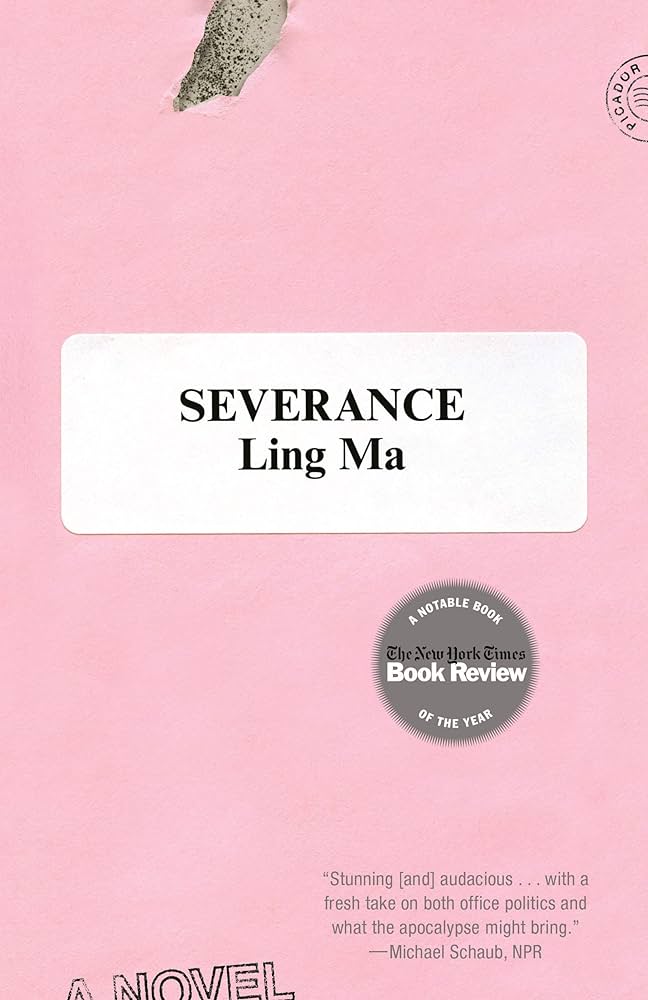“One zombie can be easily killed, but a hundred zombies is another issue […] This narrative, then, is not about any individual entity, per se, but about an abstract force: the force of the mob, of mob mentality”.
ma, 29
Ideas of survival and the collective are foregrounded; both are central to Ma’s post-apocalyptic novel Severance(2018). Whilst hinting at notions of survival, Ma’s repetition of “mob” emphasises an element of susceptibility alike a herd mindset, whilst also harking towards brutal competitiveness (29). As Monbiot establishes in How Did We Get Into This Mess?, “competition and individualism, in other words – is the religion of our time” (10). Aided by Western capitalist culture, individualism – exacerbated by self-gratification and a strand of self-serving personal autonomy – have become the supreme ethos. Severance offers an at times morbid reflection of this illusionary notion of individualism. Instead, Ma suggests that the waring notion of the ‘individual’, is not actually ‘individual’ at all – and is alternatively, a composition of the collective.
Shen Fever, an apocalyptic virus and seminal motif within the text, prospers under fundamentals of late capitalism: oblivion and repetition. Ma’s use of repetitive, forceful sentences, alike “I got up. I went to work in the morning. I went home in the evening” (150). As such, suggesting that for Candance to follow a routine, other than this, would be mindless.
Initially, Jonathan, operates as a polarity to Candace the office drone –
“Jonathan didn’t work in the nine-to-five sense. He did odd freelance gigs here and there so that he could spend most of his time writing […] Obviously, Jonathan kind of despised what I did. Maybe I did too”.
Ma, 10-12
Whilst Jonathan refuses to be a cog within the system, he subsequently suffers, alike Candace.

For Candace, working at Spectra, as a “Senior Product Coordinator of the Bibles division”, offers safety; yet safety is in exchange of self-fulfilment (Ma, 22). As Ma notes “the Bible embodies the purest form of product packaging, the same content repackaged a million times over, in new combinations ad infinitum” (23). Spectra have tapped into a nuanced market, one which is extraneously hyper-specific. Ma furthers the notion of hyper-individualism. Returning to Monbiot’s suggestions; capitalism enacts competition and individualism, whilst situating citizens as consumers (10). Individuality hinges on a desire to become a trailblazer; consumers seek out extremely niche products, alike those who purchase the Bible’s produced by Spectra. Ma writes that the Bible is “repackaged a million times”; the desire to have something unique is not truly satisfied (23). Ma furthers the waring notion of ‘individualism’, one which is repackaged and distributed to the masses. Individuals are situated within the cycle of consumption, paralleling the guise of which individuals- turned-meek zombies are lured under.
In addition to the unyielding nature of consumerism, individuals are governed by circumstance, i.e., capitalism, and its fixation on draining labour. Fisher writes in Capitalist Realism (2008),
“Capital is an abstract parasite, an insatiable vampire and zombie make; but the living flesh it converts into dead labour is ours, and the zombies it makes are us”.
15
Ma’s narrative raises the question, is it possible to ‘sever’ ties and exist outside the ant farm, or rather, the zombie farm?
Whilst operating within the ‘ant farm’ in terms of labour and consumer culture, Candance is immune from becoming a zombie. She is positioned as an outsider. Bob questions Candace’s place within the group, stating “Do you think we’re the right fit for you?” (Ma, 32). Here, Ma situates Candace’s position within the band of survivors as something unstable, in an already precarious environment. In doing so, Ma harks towards ideas surrounding identity and migration.
“Shen Fever being a disease of remembering, the fevered are trapped indefinitely in their memories”.
Ma, 160

Shen Fever is triggered by nostalgia – feelings of belonging are dangerous. Alike Ma, Candace immigrated to the US from China at a young age. Both of Candace’s parents have died, exacerbating her already detached relationship with China. Yet, Candace’s relationship with New York is also fraught. Ma writes “New York has a way of forgetting you” (151). Candace’s parted relationship with New York is further reflected in the name of her blog, “NY Ghost” (14). Candance is positioned as an outsider and an observer. As such, reflecting the ‘othering’ of immigrants. As Powell notes in ‘Us vs them’, othering “is largely driven by politicians and the media, as opposed to personal contact. Overwhelmingly, people don’t ‘know’ those that they are Othering” (n.p). The harmful sentiment which renders certain identities, i.e., East Asian / Asian Americans, as non-viable.

Ma humanises the reality of those who are continually ‘othered’, centring fiction as a means of breeding empathy. Fiction, alike Ma’s, explores the pathology of different identities and existences. Within ‘The Doom and Glory’, James Baldwin writes, “It was books that taught me that the things that tormented me most were the very things that connected me with all the people who were alive, or who had ever been alive” (n.p). By depicting the experience of the daughter of 1st generation immigrants, Ma humanises the experience. Fiction refutes the weaponizing of migrants’ identities. Whilst individuals are forged as a mass, Severance recognises the individuality of experience. Yet, Ma encourages the fostering of a unifying empathetic connection, through the recognition of multiplicity.
Ultimately, Ma dispels the capitalist-led and bred notion of individualism, and instead favours a more empathetic, collective, and restorative stance.
Word Count: 999
Bibliography
Primary Resources
Ma, Ling. Severance. 2018. Text Publishing. 2020. Print.
Secondary Resources
Baldwin, James. ‘The Doom and glory of Knowing Who You Are’. Life Magazine, May 24, 1963.
Fan, Jiayang. “Ling Ma’s “Severance” Captures the Bleak, Fatalistic Mood of 2018.” The New Yorker, 10 Dec. 2018, www.newyorker.com/books/under-review/ling-ma-severance-captures-the-bleak-fatalistic-mood-of-2018. Accessed 20 Nov. 2023.
Fisher, Mark. Capitalism Realism: Is There No Alternative? 2009. Zaro Books. pp.15. Print.
Monbiot, George. How Did We Get Into This Mess? Politics, Equality, Nature. New Left Books, 2016. Print.
Powell, John A. “Us vs Them: The Sinister Techniques of “Othering” – and How to Avoid Them.” The Guardian, The Guardian, 30 Nov. 2017, www.theguardian.com/inequality/2017/nov/08/us-vs-them-the-sinister-techniques-of-othering-and-how-to-avoid-them. Accessed 20 Nov. 2023.